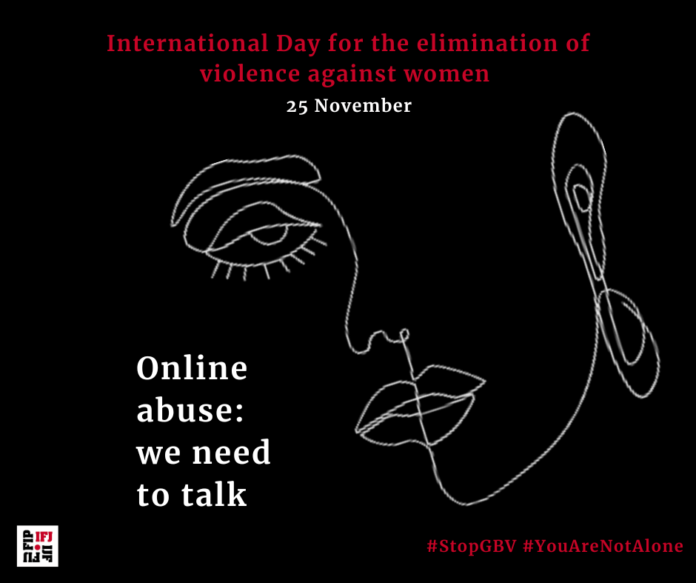To mark International Day for the Elimination of Violence against Women on 25 November, the International Federation of journalists (IFJ) and its Gender Council are urging media organisations to make tackling online abuse a priority and develop concrete steps to eradicate this threat and are calling on governments across the world to ratify ILO Convention 190 on harassment and violence in the world of work.
There is an urgent need to stand with women facing online abuse. There are direct connections between online threats and offline violence and this is something women should not be facing on their own.
These were among the key points made during the IFJ Gender Council’s conference on Women in Unions: Building power, Fighting for safety which was held online on 22 November and gathered journalists and unions’ activists from around the world. The conference was part of IFJ’s global campaign Online abuse: we need to talk, launchedto mark International Day for the Elimination of Violence against Women, which also includes the sharing of stories on fighting online abuse and 16-days of activism.
Over 60% of women journalists have faced online abuse during their career, according to IFJ statistics.
Online abuse targets women from all political, religious and ethnic backgrounds. One of the main aspects of these attacks is that they are gendered and sexualized.
These acts of violence are not only aimed at intimidating and silencing women in the media, but their chilling effects contribute to killing stories and depriving the public of information, thereby undermining pluralism and the right to access information.
The IFJ has highlighted the lack of support from newsrooms and media colleagues when a female journalist faces online abuse. Few report the attacks and, if they are reported, very little action is taken. AnIFJ survey conducted in 2018 showed that only half of the victims of online abuse (53%) reported the attacks to their media management, union or the police, and in two-thirds of the cases nothing was done.
“Less journalists tend to report online abuse because it happens all the time,” said belgian laywer Charlotte Michils to the IFJ.
” We hear again and again female colleagues’ frightening stories about online abuse. We hear about colleagues leaving the profession, suffering traumatic stress disorders. It is high time for media organisations to adopt concrete policies to counter this phenomenon and stand by their female staff, whether employed or freelance. This is not a situation any woman should be facing on her own. Online abuse is not part of the job“, says Maria Angeles Samperio, IFJ Gender Council Chair.
The IFJ has published a set of recommendations for media and unions to take action, including the setting up of workplace procedures, training on digital security or lobbying online platforms for enhanced notice and take down measures.
One other key aspect is to ensure national legislations be amended to outlaw harassment and violence in the world of work, including online.
This can be done by ratifying ILO Convention 190 on harassment and violence at work as well as recommendation 206, which the IFJ is lobbying for.
“Twenty-one countries in the world have ratified this Convention and many countries that call themselves democracies have failed to do so. We urge governments to ratify Convention 190 and its recommendation 206 as unique instruments to tackle violece against women in the world of work. We cannot sit in silence when so many of our female colleagues receive abuse online and offline for doing their job. It is a matter of public interest to ensure solid laws eradicate violence at work. And journalists badly need them“, said IFJ President Dominique Pradalie.








